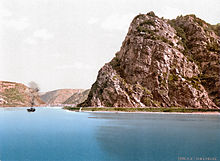Ley
Ley ( die Ley , plural: die Leyen ) is an old word for rock or cliff .
etymology
Ley , also Lay , Lei , Lai , Laige or Lägge , after Grimm Leie , is a name for rock that is often found in the Rhenish and Low German- speaking areas. The word comes from the Old Saxon lêia . It refers in particular to "rock breaks" and "rock walls", but especially "rock slab". Furthermore, it can also be found in the sense of “ slate ” or “ slate ” (Leienstein) , as well as broken as a “ slate ” as a writing utensil or “slate” in roofing ( Leiendecker ) , Dutch leyde, leye .
According to the Celtologists of the University of Trier , the term comes from the Gallic (Celtic) word lika, likka , meaning stone slab .
In addition to natural rock walls, artificial quarries , such as the basalt quarries in the Eifel , are also known as ley or lay. The workers who worked there were called layers .
Examples
- Loreley , famous slate rock on the Rhine
- Tholey , municipality and abbey in the northern Saarland
- Theley , a district of Tholey
- Erpeler Ley , basalt rock on the Rhine
- The Koblenz district of Lay
- Kaiserlei , a district of Offenbach, named after a rock on the Main
- The Rabenlay is a mountain of the Siebengebirge , at the foot of which the double grave of Oberkassel was found.
- The Rabenlay is a shoal in the Rhine at river kilometer 548.5-549.0 in Oberwesel
- Mendiger Ley , basalt mine
- Leybucht near the north ( East Frisia )
- Plästerlegge ("raining slate rock"), waterfall near the Bestwig district of waterfall
- Geierlay in (Mörsdorf Hunsrück), Germany's second longest suspension bridge
Individual evidence
- ^ Friedrich Woeste : Dictionary of the Westphalian dialect . Leipzig, 1882, p. 155 ( online )
- ↑ Reinhard Pilkmann-Pohl: Low German dictionary of the Sauerland region of Cologne. Strobel-Verlag, Arnsberg 1988.
- ↑ Leie, Lei , f. rock, stone . In: Jacob Grimm , Wilhelm Grimm (Hrsg.): German dictionary . tape 12 : L, M - (VI). S. Hirzel, Leipzig 1885 ( woerterbuchnetz.de ).
- ↑ to Lei. Forum Keltic Studies
- ↑ Vulkanschule: The Museumslay. (No longer available online.) Vulkanpark, Nationaler Geopark Vulkanland Eifel, archived from the original on May 26, 2015 ; accessed on May 26, 2015 . Info: The archive link was inserted automatically and has not yet been checked. Please check the original and archive link according to the instructions and then remove this notice.


